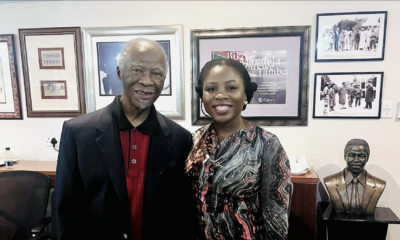Features
Harold Writes: Are Nigerians with All-English names 21st Century Slaves?
 I was at the recently concluded Art X event which held at the Civic Centre, Lagos and I attended The Talk session by Lemi Ghariokwu. Lemi’s session was an interesting one. He had the crowd on the edge of their seat throughout as he dished out thought-provoking, and I dare say, heart-wrenching words. I could gather that the theme of his speech was centred around self consciousness. Lemi was particular about Africans and our seemingly lost sense of self-consciousness. He paid tribute to the likes of the late Abami Eda of Africa, Fela Anikulapo Kuti, Malcom X, Marcos Garvey, Kwame Nkrumah and Peter Tosh. To Lemi, those were very self-conscious Black people who defied the odds of their time. If I were to rephrase Lemi’s words in street language, I would say he challenged present day Africans to be “woke”.
I was at the recently concluded Art X event which held at the Civic Centre, Lagos and I attended The Talk session by Lemi Ghariokwu. Lemi’s session was an interesting one. He had the crowd on the edge of their seat throughout as he dished out thought-provoking, and I dare say, heart-wrenching words. I could gather that the theme of his speech was centred around self consciousness. Lemi was particular about Africans and our seemingly lost sense of self-consciousness. He paid tribute to the likes of the late Abami Eda of Africa, Fela Anikulapo Kuti, Malcom X, Marcos Garvey, Kwame Nkrumah and Peter Tosh. To Lemi, those were very self-conscious Black people who defied the odds of their time. If I were to rephrase Lemi’s words in street language, I would say he challenged present day Africans to be “woke”.
To Lemi, being “woke” requires undergoing a spiritual cleansing, which must proceed from the inside to the outside. Lemi was critical of 21st century African women who “add chemical” to their hair and styled it like a Westerner would, as against grooming the hair naturally. He was also critical of Nigerians living in Nigeria who dressed up in attires that are typical of people from Brooklyn, yet they fail to imitate the achievements (technological and otherwise) of the Brooklynites. The most fascinating criticism from Lemi was the one against present day Nigerians who still bear all-English names. To Lemi, this is a betrayal of one’s identity. Recounting his story, Lemi was sure to mention that, when he became self conscious, he changed his name from Emmanuel Sunday to Lemi Ghariokwu. He did this to properly identify with his roots.
The latest criticism from Lemi is the one that piqued my interest, not least because my first name, middle name and surname are all English. Actually, I have a first name and two surnames and they are all English names. (This is very common amongst people from the South Southern part of Nigeria where I am from). Notwithstanding Lemi’s criticism, I must say that, him encouraging Nigerians to have Nigerian names is not all together, misplaced, even though I don’t think this has anything to do with one’s identity as suggested by him. Rather, I think having a Nigerian name comes with certain advantages. For example, it could determine whether or not one gets a favour in certain Nigerian settings. I can attest to this because I have experienced several unpleasant receptions in Nigeria due to not having a Nigerian name.
When I first applied for my International Passport from the Immigration Office, I went through hell (annex campus) because of my all-English names. (Nigeria is already hell, so I suppose the other hell has to be the annex campus of hell). They would not process my papers unless I produced my parents. It took some “innovations” from me to get past that phase and get my passport done. Another experience was when I got admission into the university. One of the requirements during screening was the production of a Certificate of Origin. My very own local government chairman almost denied me this certificate because of my names. It took a special intervention to get it done.
I know it might be tempting for students of pan-africanism to argue that, an essential ingredient of the African identity is the African name. Despite how tempting the foregoing invitation is, I think equating one’s name simpliciter with one’s identity would be a nebulous venture.
There is no gainsaying the fact that, the African continent is a peculiar one. We have the history of being colonized by the West (except, maybe Ethiopia and Liberia) and this experience forever shaped our lives. Yes, there was (and still is) a cross-pollination of cultures and ideas, however, I do not think that colonialism completely eroded the essence and identity of Africans. We may have adopted certain foreign concepts and ideas, but what truly makes us African is still very much intact.
Studies in the social sciences have shown that, the question of identity is multi-faceted and it is usually rooted in issues of race, ethnicity, nationality, religion, gender, sexuality etc. In other words, it is a complex question that cannot, and should not be overly simplified. As an analogy, would the fact that a Nigerian who grew up in Nigeria, but loves and eats Chinese foods, make the Nigerian a Chinese person? Of course, not. He has already undergone a deep process that cannot strip him of his “Nigerianess”. In the same vein, the fact that, a Nigerian bears an English name, does not make him less of a Nigerian or a slave to the provenance of his name. That also, certainly does not strip him of his Nigerian identity.
Recently, Kazuo Ishiguro was announced as the winner of the Nobel Prize for Literature, 2017. Kazuo was born in Nagasaki, Japan, but he is usually referred to as a British author simply because he grew up in England. Kazuo has refuted this claim of him being British and is reported to have even said, “I’ve always said throughout my career that although I’ve grown up in this country and I‘m educated in this country, that a large part of my way of looking at the world, my artistic approach, is Japanese, because I was brought up by Japanese parents, speaking in Japanese”.
Kazuo Ishiguro’s above quote inspires a befitting conclusion of this piece. We are not who we are simply because of our name, skin colour, choice of food, style of dressing etc. We are who we are because of a combination of different things, chief amongst which is our experience.
Photo Credit: © Kadettmann | Dreamstime





















